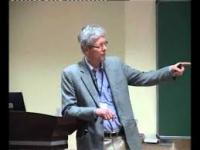Google Citations and Publications
Steven Girvin is a theoretical physicist who studies the quantum mechanics of large collections of atoms, molecules and electrons such as are found in superconductors, magnets and transistors. Of particular current interest to him is the engineering question of whether it is possible to build a quantum computer. He is collaborating with experimentalists Rob Schoelkopf and Michel Devoret in Applied Physics who are constructing superconducting circuit elements which might someday form the basis for a quantum computer. Such a computer could in principle solve problems which are impossible on ordinary computers. However in order to build a quantum computer it is necessary to create circuit devices which behave quantum mechanically (like individual atoms) despite the fact that they are macroscopic and consist of a very large number of atoms. In addition to potential practical applications, this difficult challenge will help us better understand the connections between the microscopic quantum world and the macroscopic classical world of everyday experience.
Professor Girvin is also interested in quantum many-body physics, and quantum and classical phase transitions, particularly in disordered systems. A quantum phase transition is one which occurs at zero temperature as some parameter in the Hamiltonian is varied. Using path integral techniques, one can often show that a quantum critical point in a d-dimensional system is in the same universality class as some other classical system in (d+1)-dimensions. He is interested in finding quantities that are universal properties of the system near the critical point and are independent of all microscopic details. For example, the electrical conductivity of some two-dimensional conductors at critical points is a universal dimensionless number of order unity times the quantum of conductance, e^2/h.
Much of his early work was on the quantum Hall effect, but he has also worked on the superconductor-insulator transition, the vortex glass transition in high Tc superconductors, superfluid helium in fractal aerogel, the Anderson localization problem, the Coulomb blockade problem in mesoscopic device physics, and on quantum spin chains.
